
Tay Jie Pin
BSocSc Class of 2017
Why Manitoba?
“You don’t need mobile phone plans in Manitoba. They use pigeons.” This was what greeted me when I tried to purchase a mobile phone plan at a shop in downtown Montreal. It was one of many jokes directed at me whenever I told people that I was heading to Winnipeg, the capital of Manitoba in Canada for exchange. “There isn’t any form of civilization there. You can have moose for friends.” By the way, moose are not local to Manitoba. Bisons, however, are aplenty in Manitoba. And polar bears too, let us not forget that.
Whenever I told people that I am headed to Winnipeg for exchange, I would be met with a puzzled glance, then after a beat – “Isn’t it really cold there?” Despite being met with such chilly responses, one might wonder: Why did I choose Winnipeg?
Why, indeed. I knew I wanted to study somewhere in North America. Their focus on the breadth and excellence in education had intrigued me. Top schools in the USA were out of the question, however. I did not have a GPA of 3.96, after all. That narrowed my list and I focused on what kind of experience I desired. I wanted a school which offered Criminology and Forensics, something that was not currently offered at SOSS. At the same time, I wanted a school which did not offer too many slots to SMU students. I wanted to go out and meet new people. If there were a sizeable group of Singaporeans around, chances are that I would stick with them and not be motivated to meet people of different nationalities. For that reason, the University of Manitoba was an ideal choice. The fact that I knew nothing about Winnipeg or that I have never experienced winter all my life? All the better! What is life without a little adventure?
So, having spent 4 months there, would I choose Winnipeg again?
In a heartbeat! Located in Southern Manitoba, it sits roughly in the center of Southern Canada. Compared to its flashier neighbors like Alberta (with the Rockies and Banff) and Toronto (with sprawling skyscrapers and the famed CN Towers), Winnipeg is less built up and does not boast many tourist attractions. It is a little quiet, its transport system needs work, its winter can get very harsh with temperatures going down to -30°C, but it was no less beautiful than other parts of Canada and it was where I called my home for the last 4 months.
What surprised me when I first arrived was how incredibly global Winnipeg was. I have met more people from different nationalities here than I have ever met in my life. Perhaps it was the fact that the University of Manitoba has one of the lowest school fees in North America. Or perhaps it was due to the province of Manitoba’s relaxed immigration policies. Whatever the reason, you get students arriving from virtually all parts of the world. I sat next to a girl from Chengdu (China) on the plane and she was beginning her first year as a postgraduate student in the University of Manitoba. Through her, I was acquainted with a girl from Inner Mongolia who also studied in the University of Manitoba. In a business module I took, I was grouped together with a South African girl and a Nigerian boy. I met a large community of Korean-speakers when I went for language exchange and my assigned exchange buddy was a Chinese national who grew up in Peru. I even faced off against a French student during my negotiation class! And yes, I did meet fellow Singaporeans. There are actually Singaporeans who are full-time students in the University of Manitoba! I had the opportunity to know an incredible array of people in this small city and learnt a lot about the different cultures, including Canada’s painful past with the indigenous population.
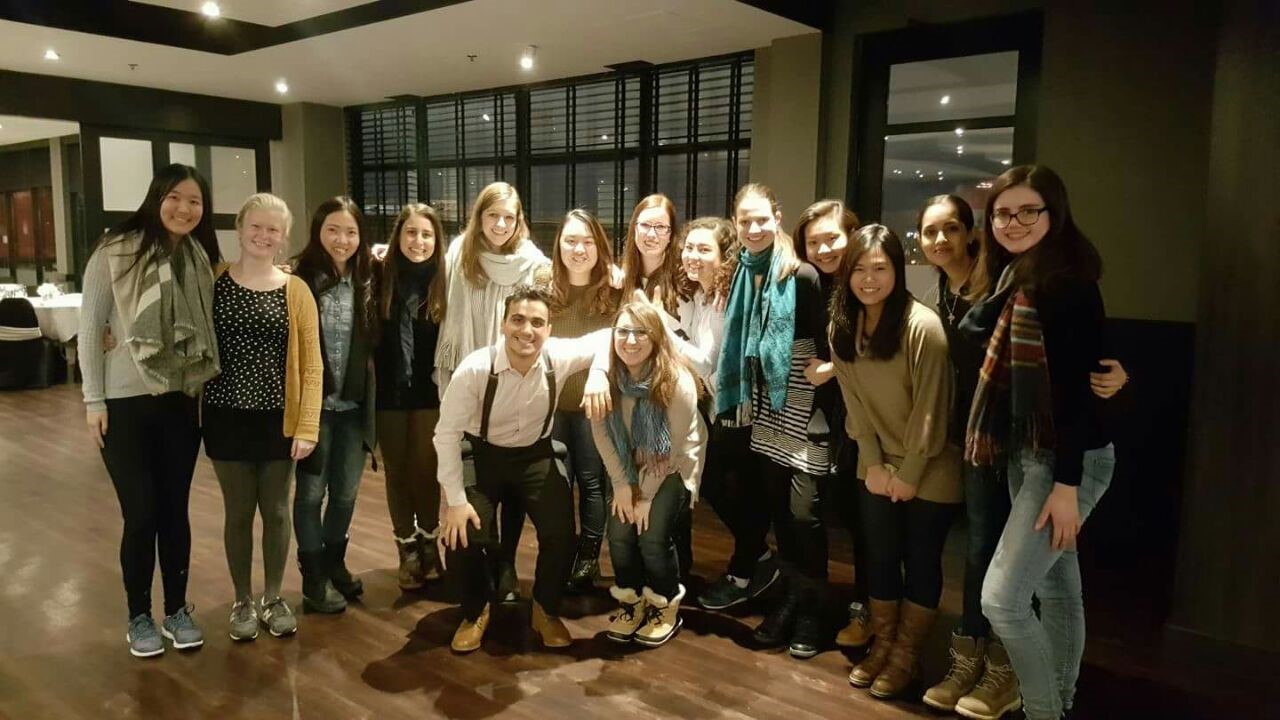 Photo was taken during our farewell. Featuring 15 people and 10 nationalities in one picture
Photo was taken during our farewell. Featuring 15 people and 10 nationalities in one picture
It is no secret that Canadians are one of the nicest people on the planet. I never knew what that meant until I experienced it for myself in Winnipeg. An SMU professor once told me that Winnipeg may be cold, but its people have some of the warmest hearts he had ever met and that more than compensated for the cold. People here have been really kind and accommodating, even to strangers. It was in how they readily offered help to others, in how they drew us into their community with ease and made us feel welcome, without us ever feeling like outsiders even though we were not local.
Wholly Canadian Experiences
Football
Canadians can get pretty passionate about sports. During the summer and fall seasons, Canadians get pretty heated up on American Football. Don’t call it that though, Canadians hate that. Just call it “Football”. As enthusiastic exchange students, we went to support the Bisons, the official name of Team University of Manitoba, decked out in full Spirit gear.
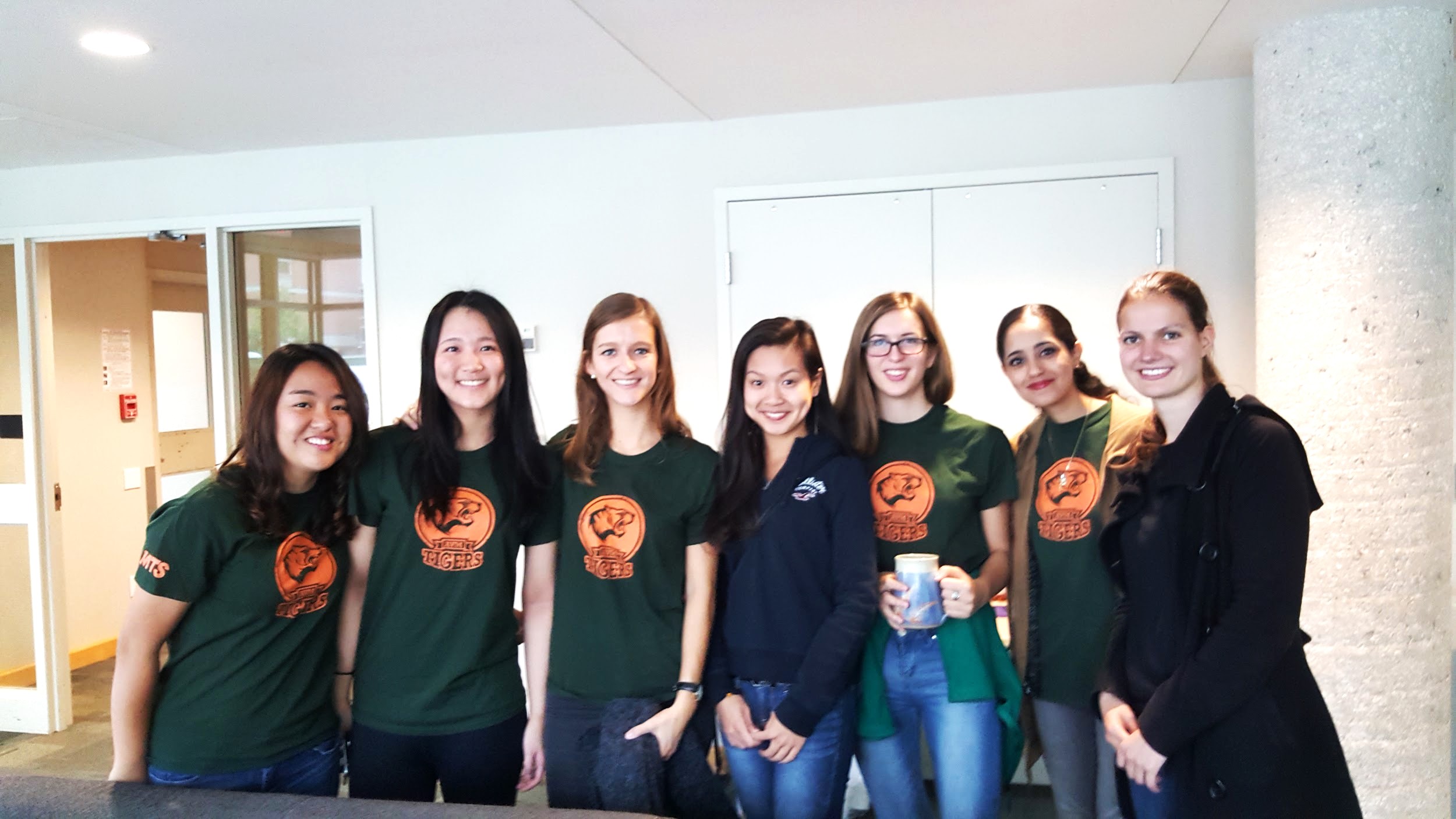 Go Bisons! Go Green!
Go Bisons! Go Green!
 Look at the audience in the stands. Really crowded right? Contrast it with our friends who went on exchange at Concordia University and HEC Montreal in Quebec.
Look at the audience in the stands. Really crowded right? Contrast it with our friends who went on exchange at Concordia University and HEC Montreal in Quebec.
 The situation at a Concordia versus HEC Montreal game. Well, I guess it is because the population of Winnipeg isn’t that huge, right?
The situation at a Concordia versus HEC Montreal game. Well, I guess it is because the population of Winnipeg isn’t that huge, right?
Ice Hockey
What are Canadian sports without some Ice Hockey? Their fascination with the sport is strangely easy to relate to. I have to state here that I do not condone violence and I get queasy watching any sort of physical brawls on television. However, there is something about hockey that make it seem so... intriguing. However nice Canadians are, all politeness and niceties are left outside the rink when they are playing hockey. There are shoves, pushes and what can almost be considered an all-out brawl. We watched the games between the Manitoba Bisons versus the Lethbridge Pronghongs and it was exhilarating! The Bisons weren’t doing all that well; I nearly found myself rooting for the other team. They were so much more coordinated and the Bisons were left gasping and defending against their opponent’s very strong offenses. There was never a dull moment in hockey. With football, it can get pretty confusing when you don’t know the rules. With hockey, you can follow it pretty closely and it can get really intense. I recall that we were cheering really loudly when Bisons eventually scored.
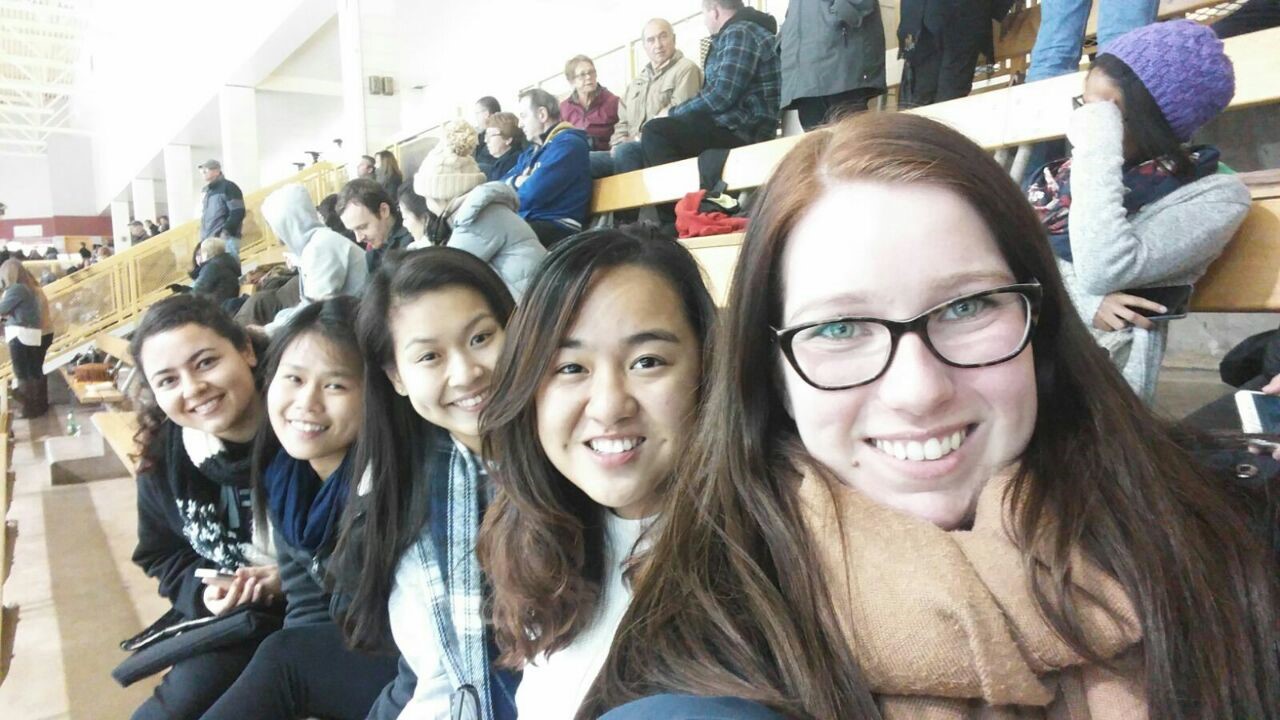 Our very first Hockey game. The seats were pretty crowded! Students at University of Manitoba definitely enjoyed Hockey more than Football.
Our very first Hockey game. The seats were pretty crowded! Students at University of Manitoba definitely enjoyed Hockey more than Football.
 The Timbits (the little kids from the Junior League who were representing Winnipeg) in action during the intermission! How cute is it that they were named after a snack from the popular fast food chain Tim Hortons?
The Timbits (the little kids from the Junior League who were representing Winnipeg) in action during the intermission! How cute is it that they were named after a snack from the popular fast food chain Tim Hortons?
 As riveting as the game was, I was partially distracted by Billy (the Bison mascot) as he played with the kids from Timbits.
As riveting as the game was, I was partially distracted by Billy (the Bison mascot) as he played with the kids from Timbits.
Halloween
I was very excited about Halloween, given Singapore’s indifference over this festival. It was an entire week of non-stop activities on campus, ranging from haunted houses to spooky parties. There is always something for everyone on Halloween.
 Halloween shopping. We saw some pretty terrifying masks when we were there.
Halloween shopping. We saw some pretty terrifying masks when we were there.
 What is Halloween without some zombies?
What is Halloween without some zombies?
 On our way to the haunted house ‘Carn-Evil’ hosted by Residences
On our way to the haunted house ‘Carn-Evil’ hosted by Residences
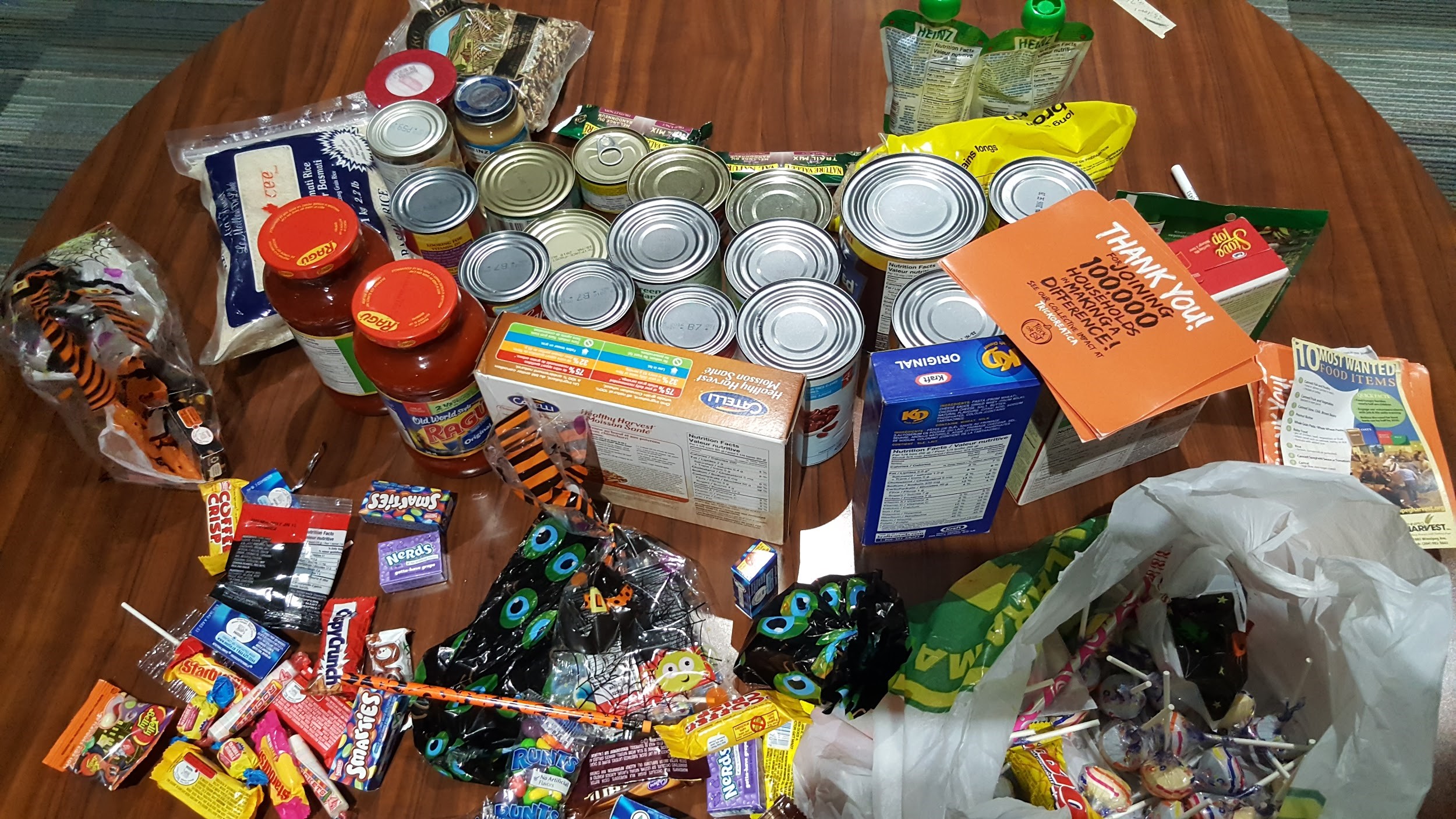 Our loot during trick-or-eating with Winnipeg Harvest. This organization collects canned food from the public to donate to the lower income households in Winnipeg. We went around the neighborhood asking residents (who were already informed) for some canned or dry goods. Along the way, we received some candy. Who are we to refuse well-meaning residents who gave us candy to spread the Halloween cheer?
Our loot during trick-or-eating with Winnipeg Harvest. This organization collects canned food from the public to donate to the lower income households in Winnipeg. We went around the neighborhood asking residents (who were already informed) for some canned or dry goods. Along the way, we received some candy. Who are we to refuse well-meaning residents who gave us candy to spread the Halloween cheer?
The Strike
One of the most compelling things that happened during my 4-month long stay at the University of Manitoba was the faculty strike that spanned for 3 weeks during the semester. The University of Manitoba Faculty Association (UMFA) held a strike vote in mid-October 2016, citing unfair work allocation, low compensation and mediocre salary increases as reasons for holding the strike vote. The results were unanimous, with 85.6% of the members of UMFA calling for a strike. This comes as no surprise, seeing as the faculty of the University of Manitoba received the lowest compensation out of 13 comparable Canadian research universities in 2015. The low compensation rates also meant that capable members of the faculty sometimes leave the University for “greener pastures” and the University Administration sometimes find it very challenging to hire another person of similar caliber. As a result, the Administration made changes to existing faculty’s workload, increasing the Arts faculty’s workload by 30% overnight in 2015. The situation was further exacerbated when it was revealed that the University Administration commanded a disproportionately high salary. At $452,000 CAD per annum in 2015, President David Barnard’s salary ranked 3rd among 13 comparable Canadian research universities in 2015.
In October, UMFA and the school Administration were making headway in the negotiations but the provincial government of Manitoba had stepped in and announced a unilateral wage freeze for all faculty, thereby negating the progress made during the negotiations. This was the final straw that broke the camel’s back and prompted UMFA to proceed with the strike on November 2nd.
This episode was especially riveting, especially since I was enrolled in a Negotiations and Conflict Management course and our professor was able to give us a play-by-play account of the progress (or non-progress) made in the negotiations. It was exciting for me, a Singaporean, to witness a ‘protest’ of sorts happening right before me. The fact that two of my classes were cancelled were icing on the cake (more time to do my assignments!). Here, students were passionate about the strike and it was a stark contrast to the attitudes of students from different nationalities. A friend from France was wondering what the fuss was about - strikes happen often and something like this should not be a big deal. Here, it was a big deal. The student union was accused of not taking a stand and public opinion were divided into 2 opposing camps. Those supporting UMFA noted that their course offerings had become more limited, with their professors being increasingly stressed out and unavailable due to the increase in workload, resulting in the declining quality of their education. On the other side of the fence, the students were appalled that the Professors were demanding an increase to their already decent salaries - It is no secret that being a college professor pays well. As far as these students were concerned, their exorbitant school fees went into lining these Professors’ pockets. In fact, UMFA’s condition of 6.9% increase was way above the rate of inflation. Their call for increased control of their workload and having some say in the college administration was obviously unreasonable - they were paid to teach and conduct research; what they were asking for was evidently beyond their job scope.
The first week was very arresting - the professors can be seen picketing daily outside the school and students have also taken to voicing their opinions on social media. However, as the second week of the strike rolled by, students were beginning to get restless and the University Administration was beginning to prepare for the worst-case scenario, even considering the possibility of delaying the final examinations and having the semester end later. This ruling did not sit well with the students and it had caused an uproar - this could mean the possibility of a delayed graduation, and students who have jobs lined up for them will be unable to fulfil their obligations. On top of that, due to the large international population that attends the University of Manitoba, many of the students have already booked their flights back home for the holidays. These would also mean financial strain on students and further stress as they have to rearrange their plans. A student had started an online petition on Change.org and it quickly gained 2500 signatures in 20 hours. Yours truly was among the 4864 signatories it had racked up within the course of a few days! The result was swift - The University Administration responded quickly. They came up with several alternatives for the students and advised them to speak to their professors about their personal considerations. It was not until the end of the third week did we see an end to the strike (a full 21 days!). UMFA and the school administration had settled on what they called a "fair deal", although few details have been publicly released.

This experience was definitely unique and standing with the students to lobby for something we were passionate about was truly exhilarating. I would have joined in with the picketing, not just for the cause that I supported, but also for the experience of it all. However, thanks to many words of warning that the people around me (and even friends from Singapore) had cautioned me with (“it might get violent!”), I had stayed away. I did show my support online though!
Outtakes/Our Misadventures with the Weather
Travelling is always fun, and it is made even more fun by the added element of unpredictability known as the weather.
New York City
I arrived in New York in August, right in the heat of summer. Guess what the temperature was? Hotter than Singapore? You guessed it right! 38 degrees on my first day there. Makes for great pictures, sure! But can you imagine the scorching hot sun burning with not a gust of breeze in sight?
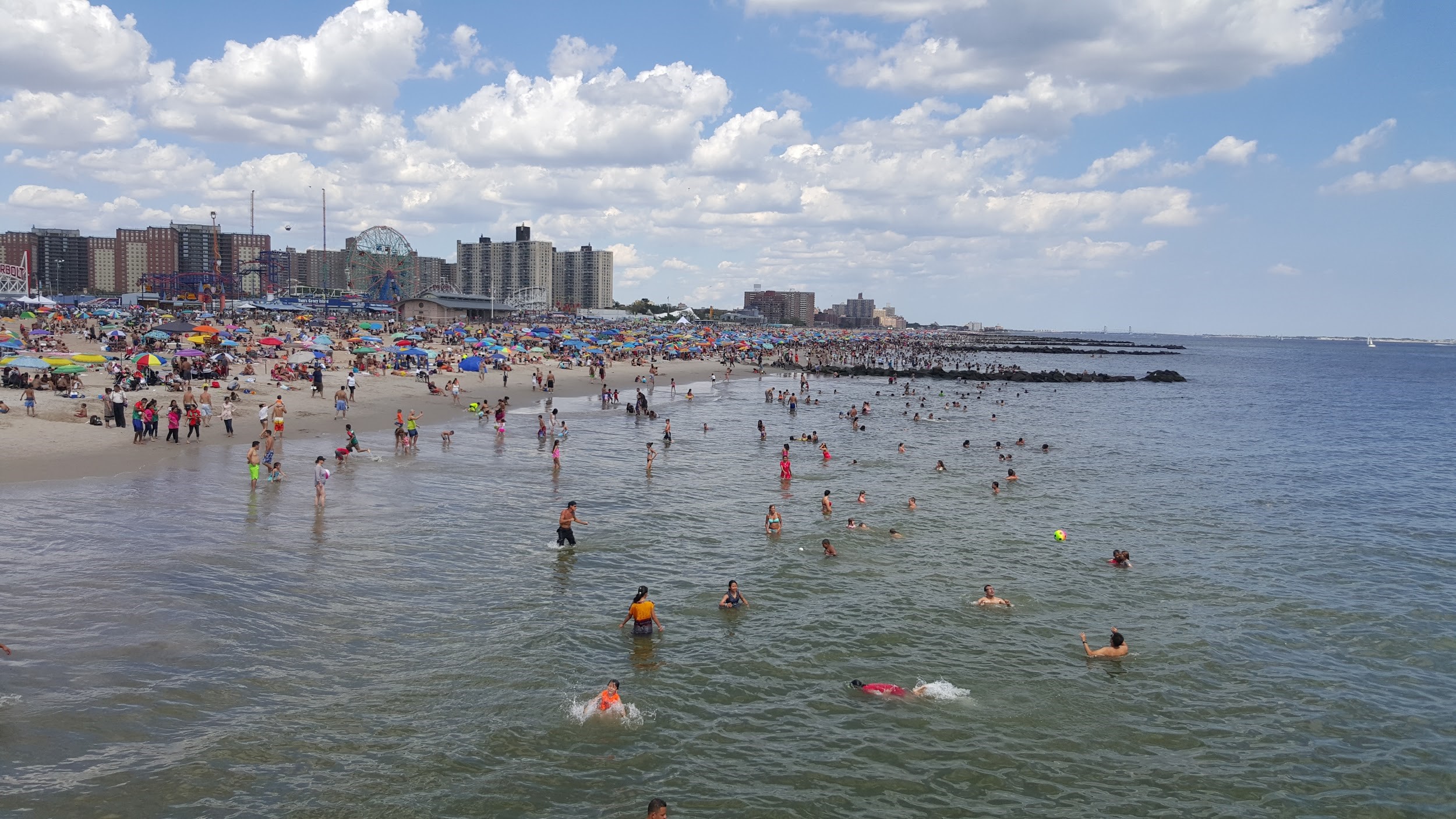

 Photos taken at Coney Island, New York on a hot and sunny day
Photos taken at Coney Island, New York on a hot and sunny day
Yellowknife
Google told us it was going to be -30°C. We layered up accordingly and yet, it never seemed enough. In fact, the island is littered with eateries that offer the option of delivery as walking simply isn't an option in the cold. We were told by our guide that we should not be outside for longer than 15 to 20 minutes (this remains true for locals too).
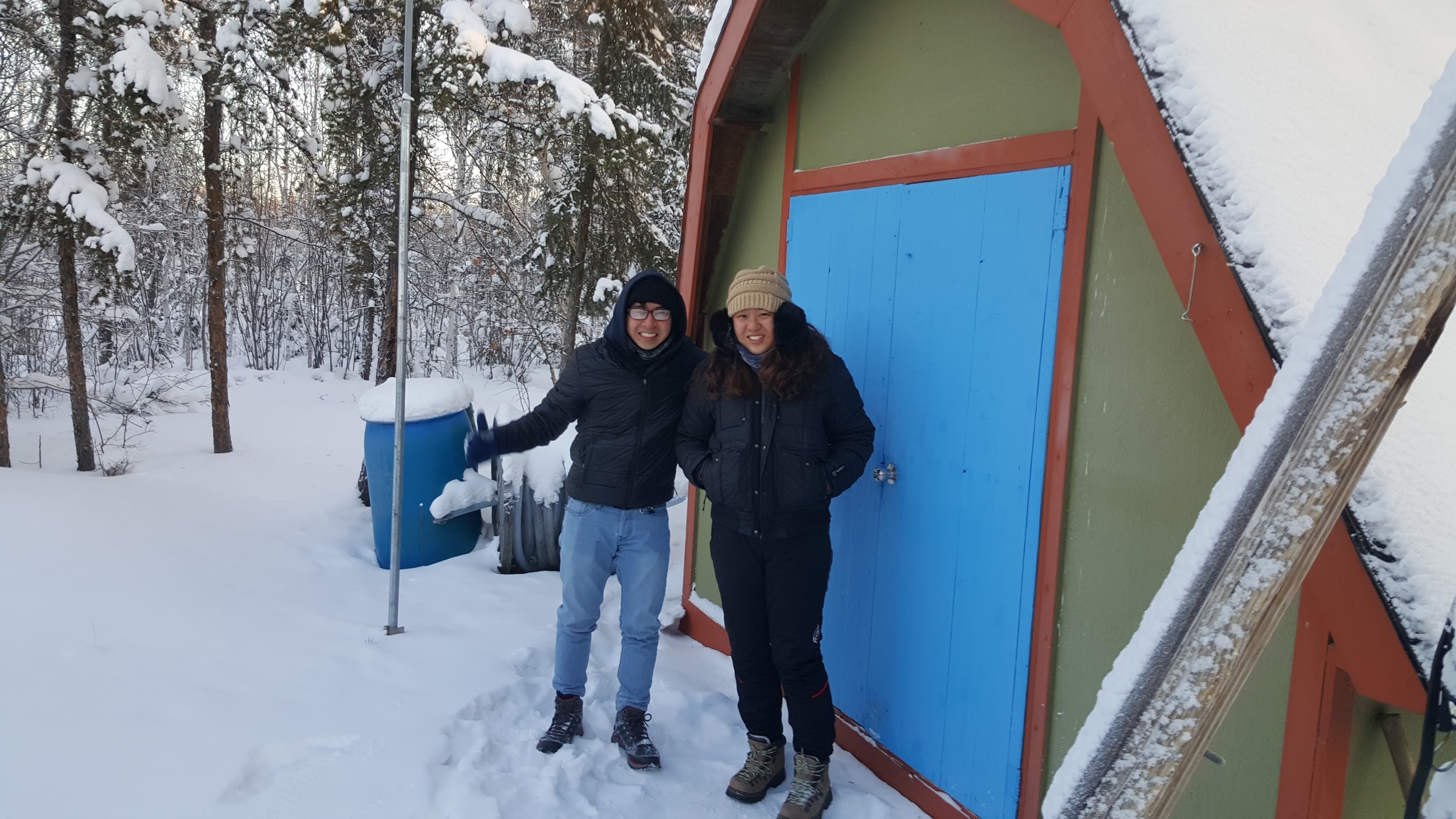 Here, you have a picture of me and my cousin (he went on Exchange to the University of Waterloo). This photo was taken seconds after he had, well, frozen his nose. (It did hurt especially when he was no longer in the cold.)
Here, you have a picture of me and my cousin (he went on Exchange to the University of Waterloo). This photo was taken seconds after he had, well, frozen his nose. (It did hurt especially when he was no longer in the cold.)
 We did manage to catch a smidge of Northern Lights, which was pretty lucky! Staying out in the cold was definitely worth it! (Photo provided by the tour operator we travelled with.)
We did manage to catch a smidge of Northern Lights, which was pretty lucky! Staying out in the cold was definitely worth it! (Photo provided by the tour operator we travelled with.)
Vancouver
Ah, Vancouver! It is said that you absolutely have to visit this city, especially if you visit Canada. And we did. Lovely view it was! Except, do you know what Vancouver's nickname was? Raincouver! We left Winterpeg for Raincouver! Cold temperatures? We can handle that! Winterpeg's a lot worse. Rain? Hello, rain in Singapore is as common as sunny days. We can handle a little rain. Have it rain at temperatures between 1°C to 4°C? That, my friend, is a deadly combination. I was shivering to the bones and it did not get better when I ran indoors for shelter. The cold stays with you long after. That was also the day when I discovered that the down jacket I bought at the store was not at all waterproof. Not fun.
 Picture of Stanley Park in Raincouver. The rain does kind of give the park a… magical feel, doesn’t it?
Picture of Stanley Park in Raincouver. The rain does kind of give the park a… magical feel, doesn’t it?
Disneyland (California)
Remember the cold and wet combination I was writing about? It happened again. This time on New Year's Eve at the happiest place on earth. Even the famed Paint the Night parade was cancelled! On New Year’s Eve! Heralds a great start to the New Year, eh? Though we did manage to catch the fireworks display and it was spectacular! The rain stopped just a little while before midnight and we were very grateful for that.



Arizona
Arizona. This arid landscape boasts one of the Seven Wonders of the World - the Grand Canyon. What a magnificent view it must have been, right? If it was not cloudy that day, perhaps that could have been the case. We would just have to settle with “I-think-I-can-see-the-Grand-Canyon-if-I-just-squint-a-little” kind of pictures. The desert landscape is often sunny. What are the chances that it was cloudy on the day we visited? To be fair, the sky cleared up just a bit in the afternoon and we managed to catch some breathtaking views.
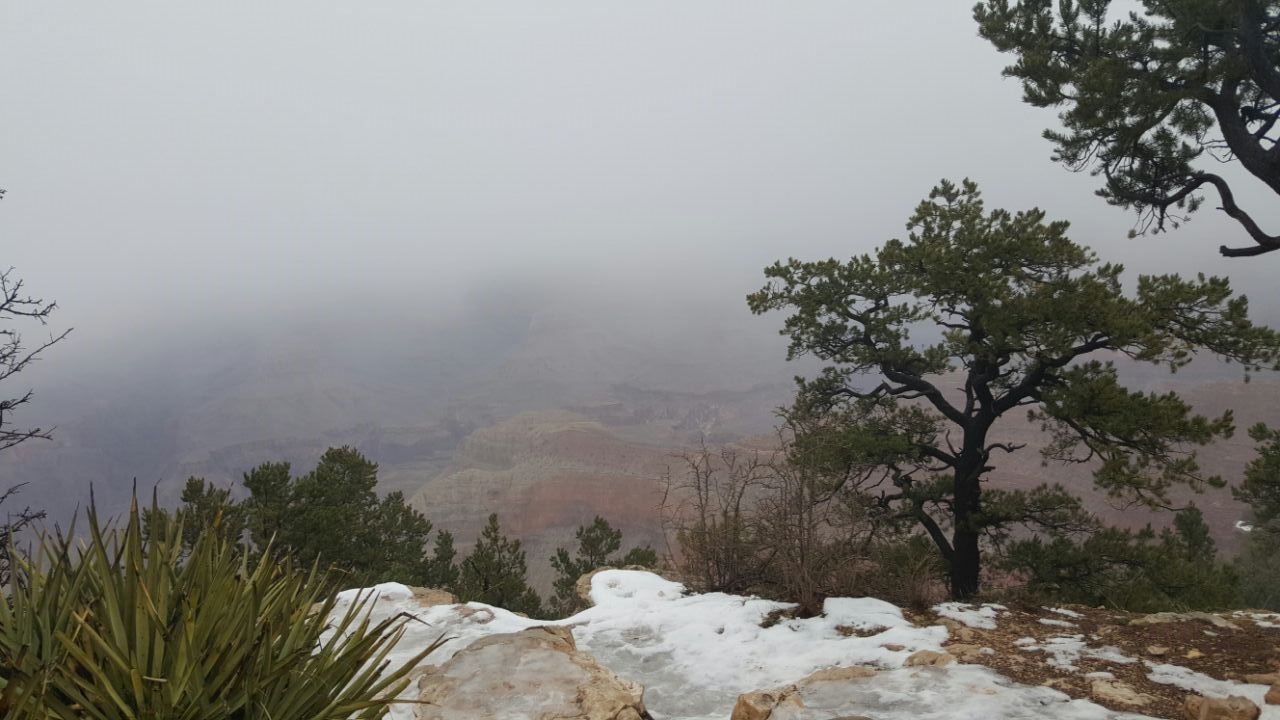 Best view of the Grand Canyon we had at 1pm in the afternoon.
Best view of the Grand Canyon we had at 1pm in the afternoon.
 Very spectacular views at 3pm. Only, the winds were pretty spectacular too!
Very spectacular views at 3pm. Only, the winds were pretty spectacular too!
Of Independence and Dependence
Exchange was a study in independence and an opportunity for me to test my wings as I stayed away from home for an extended period of time. It was four months of learning how to cook, figuring out the washing machine and coping with the perils of living away from the comforts of home. Cooking was the easy part - well, how hard can it be to follow instructions on recipes? It doesn’t matter if you can’t find the exact ingredients - as long as the final product is edible, anything goes! Though it did come as a shock to my roommate and I that vegetables do not last longer than 3 to 4 days here. Back home, you can leave the vegetables in the fridge for a week or two and have it looking, well, green. Imagine our shock when we attempted to cook asparagus one day when it emerged out of the fridge looking distinctly different from how asparagus should look. I guess it is great news that these vegetables are fresh and not infused with preservatives. Right?
And learning how to work the washing machine was another lesson in independence - Did you know that comforters and blankets cannot be washed in the same load as regular clothes? Apparently the comforter will absorb most of the water, leaving none for the other items in the wash. Well, now you know! It took me many tries, several changes of washing machines and reallocation of wash loads before I successfully had my laundry done. It is in these tiny details that are often overlooked that had me missing the comforts of home. Where is mummy when you need her?
While I would like to say that there were drastic shifts in perspectives and my world view had somehow been altered during my exchange journey, the truth is somewhat less dramatic and more than a little ironic. While exchange had taught me to be somewhat independent, these past 4 months had, to a larger extent, taught me how to depend on others. Yes, you didn’t misread that. One of my biggest takeaways from exchange was the gift of learning to depend on others and learning to accept someone else’s kindness. While I am somewhat helpless on the domestic front, I consider myself relatively independent in other aspects of my life. I am able to get to anywhere in Singapore (with trusty Google maps and exceptional observation skills) and am pretty resourceful in situations. If I am ever in need, I could rely on my close-knit group of friends and family. And even those instances were few and far between. However, you do not have the luxury of family and close friends when travelling and you are forced to rely on strangers and new friends. In fact, little things like transportation becomes a colossal task. A new friend my roommate and I just met had offered us weekly rides to the supermarket - he lived near the school and he had to head to the supermarket anyway. We initially declined as we did not want to trouble him and we were surviving well with taking the public transportation. Alright, the bus timings could be a tad inconsistent. And it can get rather chilly standing at bus stops. And the bus does not stop at certain places on weekends. Apart from that, we were doing terrific! However, he told us that winters here could be very cold and it would be very inconvenient if we had declined his kind offer - we did not need any more convincing after that. And so weekly supermarket outings became part of our routine.
Another lesson in dependence occurred sometime in late October, nearing the end of fall. Most exchange students and full-time International students attending the University of Manitoba have never experienced winter. Even for those who grew up in countries that cycle through different seasons (read: not Singapore), winters in Winnipeg are in their own league when it comes to how brutal they can be. A student group on campus had kindly organized a Winter Survival talk for international students, complete with free winter socks and free winter wear store (filled with clothes donated by students from University of Manitoba and members of the local church). This was provided by Winnipeggers who understood how unkind and unrelenting the winters here can be. Thanks to them, I learnt how to dress and layer up, how to prevent frostbite, what to eat during winter and I even received a coat (thick enough to tide me through fall while I searched for a suitable winter jacket), neck warmers (they are lifesavers!) and mittens (bet you didn’t know that mittens are warmer than gloves because they keep your fingers together, thereby trapping the heat!). When I travelled to Yellowknife (in the Northwest Territories of Canada) with my cousin during term break, we were also at the receiving end of our Airbnb host’s kindness. When we arrived at her door, she knew immediately that we were inadequately dressed for this part of Canada. It was -30°C out and the wind-chill factor could make the temperature feel like -40°C. While we were dressed in our warmest, it was still lacking. She then loaned us her thick winter coats at absolutely no cost. If I were home, I might have declined that offer. Perhaps I could find something more to layer up with. Or borrow from a close friend. But it was cold, and she was right, and we really needed the coats.
All these instances were just a small fraction of the incredible amount of kindness I received from the people I met in Winnipeg and in my travels. For me, the feeling I get when I depend on others is one of discomfort. There is a certain vulnerability one experiences when relying on others. I was used to doing things on my own and getting things done. However, when I was thrown into an unfamiliar environment and had to turn to others around me for help, it can be more than a little disconcerting at first. But through the many encounters during this exchange, I learnt to count on others - my roommate, new friends made on exchange, random strangers - and found the process to be empowering. In fact, it had helped strengthen relationships and taught me more than a few things. I learnt to accept help and even tried asking for help when needed. You would be surprised by how willing people are to give advice and provide support. I still feel a little awkward about it - but I have resolved to return their favors someday. And if I cannot, I just have to pay it forward - by showing exchange students around and making them feel at home here in Singapore.
Back Home
Coming home felt a little strange. The place I loved and grew up in felt the same, only I wasn’t quite the same. It was in the small changes; I kept saying sorry whenever I bumped into people or get bumped into. And then found it strange when people don’t respond or stared at me as if I had grown two heads. It was when I had the urge to smile at strangers in the lift and thanked someone for holding the doors (and not the awkward nod I used to shoot people’s way). I could not help it that I brought back a little bit of the Winnipeg spirit with me. In Canada, when even buses apologize for not being in service, you can’t help but be a little more polite in your dealings with other people.
 Only in Canada where even buses apologize to people. Photo taken at the University of Manitoba bus stop.
Only in Canada where even buses apologize to people. Photo taken at the University of Manitoba bus stop.